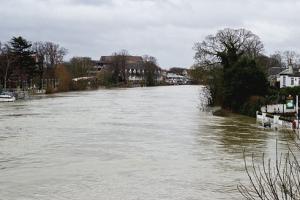FloodsClimate change likely to increase frequency, magnitude of severe U.K. flooding events
Last December, following severe flooding across parts of Northern England and Scotland and on the eve of the climate summit in Paris – which was held 30 November – 12 December 2015 — Lord Deben, chairman of the U.. Committee on Climate Change, said: “Defenses that might historically have provided protection against a 1 in 100 year flood will, with climate change, provide a much lower level of protection and be overtopped more frequently. The latest projections suggest periods of intense rainfall could increase in frequency by a factor of five this century as global temperatures rise.”

Severe flooding in Staines-upon-Thames, in the U.K. // Source: commons.wikimedia.org
Last December, following severe flooding across parts of Northern England and Scotland and on the eve of the climate summit in Paris [held 30 November – 12 December 2015], Lord Deben, chairman of the Committee on Climate Change, said:
The devastating flooding this weekend [5-7 December 2015] is a timely reminder that climate change is expected to increase the frequency and magnitude of severe flooding across the United Kingdom. Rainfall records have been broken again, with more than a foot of rain falling in twenty-four hours in some areas. Cumbria has suffered a series of severe floods in the last decade, in 2005 and again in 2009.
Despite the significant investment that has taken place in recent years — £38 million was spent improving flood defenses in Carlisle after the 2005 floods; £4.4 million in Cockermouth and £6 million in Keswick after 2009 — severe flooding can still be expected. Rainfall totals over the weekend exceeded the higher defense levels that have been put in place. Defenses that might historically have provided protection against a 1 in 100 year flood will, with climate change, provide a much lower level of protection and be overtopped more frequently. The latest projections suggest periods of intense rainfall could increase in frequency by a factor of five this century as global temperatures rise.
If the Paris climate change talks make good progress, and warming is limited to no more than 2°C, then with additional flood risk management effort the United Kingdom should be able to avoid increasing flood risks and impacts.
However, if global greenhouse gas emissions do not peak soon and start to fall, 4 or more degrees of warming could take place this century. This would lead to severe and unavoidable increases in U.K. flood risk. If average global temperatures rise by 4°C, expected U.K. flood damage would double, even assuming the government continues to invest in flood defenses. An extra one million U.K. homes would be exposed to a high risk of flood damage, with a 1-in-75 or greater chance of flooding in any given year.
This emphasizes the importance of securing a strong and binding deal in Paris this week.
The CCC noted that Lord Krebs, chairman of the CCC’s Adaptation Sub Committee, said: “In our report to Parliament on the government’s National Adaptation Program, we highlighted flood risk as one of four key areas for urgent further action. The Cumbria floods highlight the problem that is likely to become more severe in the decades ahead.”
